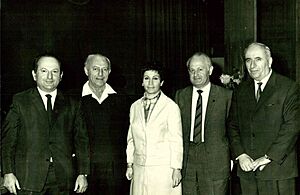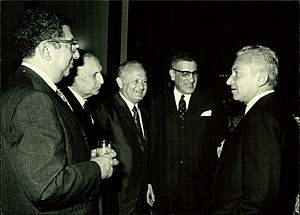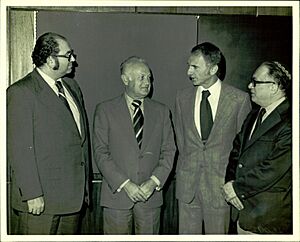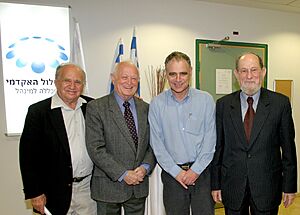Moshe Sanbar facts for kids
Quick facts for kids
Moshe Sanbar
|
|
|---|---|
| משה זנבר | |
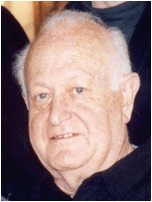 |
|
| Born |
Gusztáv Sandberg
29 March 1926 Kecskemét, Hungary
|
| Died | 1 October 2012 (aged 86) Tel Aviv, Israel
|
| Nationality | Israeli |
| Education | Hebrew University of Jerusalem (MA) |
| Occupation | Economist
Governor of the Bank of Israel (1971-1976) |
| Years active | 1951–2012 |
| Spouse(s) |
Bracha Rabinovich
(m. 1951) |
Moshe Sanbar (Hebrew: משה זנבר; March 29, 1926 – October 1, 2012) was an important economist and public figure in Israel. He was the head of Israel's central bank, the Bank of Israel, from 1971 to 1976. He also led Bank Leumi, a major bank, from 1988 to 1995.
Moshe Sanbar was born in Hungary. He survived the Second World War as a prisoner. After moving to Israel, he started as an economic researcher. He then worked his way up in the Ministry of Finance. He became the head of the budget department and an economic advisor.
After his time in government, he worked in the private sector. He also did a lot of public service. He helped many organizations in education, culture, sports, and science. He was especially active in helping Holocaust survivors. He founded an organization for them in Israel. He also worked with the Claims Conference to get money and support for survivors worldwide.
Contents
Who Was Moshe Sanbar?
Early Life and Challenges
Moshe Sanbar was born as Gusztáv Sandberg on March 29, 1926. His hometown was Kecskemét, Hungary. His parents, Salomon and Miriam, died during the the Holocaust in Hungary in 1944. His father was arrested by the Nazis. His mother died in Auschwitz.
In his youth, Moshe loved sports. He played table tennis, fencing, wrestling, and soccer. He was even a high school wrestling champion. When the Nazis took over Hungary, Jewish players were removed from sports teams. Sanbar then started a soccer league just for Jewish players.
Life During World War II
In June 1944, Sanbar was forced to join the Hungarian Army's labor groups. In October 1944, his unit was marched to the Austrian border. From there, he was taken to Dachau concentration camp in Germany. He was freed by the Allied forces on May 2, 1945. This happened near Seeshaupt while he was on a train to an extermination camp. After being freed, he got sick with typhus in a hospital. He later wrote a book about his wartime experiences called "My Longest Year." It was one of the first books by a Holocaust survivor printed in Israel.
After the war, Sanbar returned to Hungary. He studied economics at the Budapest University of Technology and Economics. He also joined a Zionist movement called HaOved HaTzioni. He helped organize training programs for people wanting to move to Israel.
Moving to Israel
In 1948, Sanbar joined the Hagana, a Jewish defense group. He led a group of 60 people to British Mandate of Palestine. He arrived in Israel in May 1948. He joined the IDF and was badly hurt. This happened during the Battle of Latrun in the 1948 Arab–Israeli War.
He finished his master's degree studies in 1953. He studied economics, statistics, and sociology at the Hebrew University.
Professional Career in Israel
Research and Government Work
In 1951, Sanbar started working as a researcher. He was a statistician at the Institute for Social Applied Research. By 1956, he became the deputy director. He also taught at the Hebrew University from 1957 to 1962.
He was a pioneer in studying how people spend money. He also researched how income is divided among people. His work was very important. It was one of the first studies of its kind based on a large public survey.
In 1958, Sanbar began working for the government. He joined the Ministry of Finance. He became the first director of the research division. He later became deputy director. He worked on taxation and led many government committees on financial issues. He was involved in the 1962 devaluation of the Israeli currency.
He also represented the government on the boards of various companies. For example, he was chairman of the finance committee for El Al, Israel's airline. In 1967, he helped start the Israel Sports Betting Board. This board manages the national football pool.
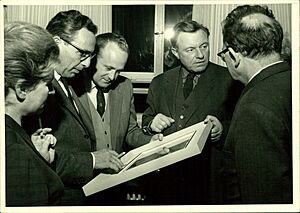
Sanbar became the chief financial advisor to the Ministry of Finance. A few months later, he became the Director of Budgeting. He believed in planning the budget for four years. This helped with long-term development plans for different parts of the economy. He even advised the United Nations on budgeting. He also led a government commission to make public services better. He helped create a plan for using computers in government work.
He also helped develop industry and science. He changed government loans into research grants. He also helped set up scientific centers near universities. He encouraged Israel to export its knowledge and services.
During the 1960s, Sanbar was in charge of the government's wage policy. This included wages for all parts of the economy. He often helped solve labor disputes and worker strikes. After the Six-Day War, he oversaw economic policies. This included policies for Palestinians in the West Bank and Gaza Strip. He also worked on developing Jerusalem, including the Western Wall and the Jewish Quarter.
Leading the Industrial Development Bank
In 1968, Sanbar became deputy chairman of the Industrial Development Bank. He became chairman in 1970. Between 1968 and 1971, the bank gave out many more development loans. The bank's business grew a lot during this time.
Acting Minister of Trade and Industry
From 1970 to 1971, Sanbar was the acting Minister of Commerce and Industry. He worked to stop prices from rising too fast and to control inflation. This was a big problem because of security threats and more taxes. He helped create a "package deal" with the Histadrut (a labor union). This allowed for higher taxes but also increased wages.
He also worked on laws to protect consumers. He helped prevent unfair competition. He also supported the development of the Merkava battle tanks. This was good for Israel's industry.
Governor of the Bank of Israel
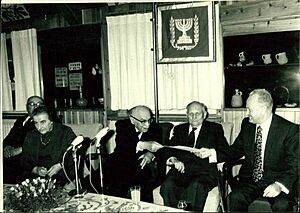
Moshe Sanbar served as Governor of the Bank of Israel from 1971 to 1976. This was a very challenging time for Israel's economy. The Yom Kippur War had huge financial costs. The 1970s energy crisis made gas prices four times higher. Also, military spending increased after the Six-Day War. His "emergency credit" policy during the Yom Kippur War helped keep the market stable.
He made important changes to Israel's money system. For example, the central bank became responsible for watching the foreign exchange market. The value of the Israeli pound was also linked to a group of currencies, not just the US dollar. New banks were founded, and some older ones closed. This led to new laws about banking in Israel.
As governor, Sanbar represented Israel in many international groups. These included the International Monetary Fund and the World Bank. He also proposed two important international ideas, known as the "Sanbar Proposal." One was about helping developing countries with investments. The other was about selling gold under the supervision of the IMF.
He also modernized the Bank of Israel. He created a public complaints office. He also made the department that watches banks stronger. When the Israel-British Bank collapsed, the Bank of Israel used its new powers. It appointed a director and guaranteed money for clients. This helped protect people's savings.
Sanbar believed the central bank governor should be separate from the government's economic advisor. During his time, the Bank of Israel's research department became very important. It created policy papers and a database for economic information.
In early 1976, Sanbar decided not to serve a second term. His signature can be found on the Israeli Pound fourth series banknotes.
The Sanbar Commission
Even after leaving government, Sanbar continued to serve the public. From 1977 to 1981, he led a government commission. This commission looked into local governments in Israel. It studied how they were funded and how they worked with the central government. The commission made many recommendations. These included giving local governments more control over their own money. They also suggested clearer rules for government support. Some of these ideas became law in 1978. The full report was adopted by the government in 1984.
Private Sector Leadership
From 1977, Sanbar held many leadership roles in private companies. He chaired industrial and financial institutions. He was also a member of the executive of the Manufacturers Association of Israel.
He was often considered a possible candidate for Minister of Finance. He advised Shimon Peres on economic matters. He also helped with the 1984 "package deal" and the 1985 Economic Stabilization Plan.
Chairman of Bank Leumi
From 1988 to 1995, Sanbar was the chairman of Bank Leumi. This was a difficult time for the bank. It had faced leadership changes and labor problems. It also had large debts from major organizations.
Sanbar brought new ways of making decisions to the bank. He focused on professional subcommittees. He also changed how the bank helped companies in trouble. The bank would only help if the companies were taking steps to improve themselves. By the end of his term, the bank was stable and growing again. He also encouraged the bank to invest in new businesses and growth funds.
Sanbar also chaired the bank's branches in other countries. He helped reopen branches in Germany after the dissolution of the Soviet Union. He also worked on creating a credit company in Budapest. In 1993, Bank Leumi tried to create a Palestinian bank with other European firms. However, this effort did not succeed.
Bank Leumi also focused on helping the community. They funded the restoration of Bialik House. Sanbar also helped create a special fund. This fund supported community projects and businesses for Arab Christians in Israel.
Sanbar was also chairman of the Association of Banks in Israel. In 1995, he decided not to seek reelection to Bank Leumi's board. He continued to work as a financial consultant.
President of ICC in Israel
Between 1992 and 2003, Sanbar was the president of the International Chamber of Commerce (ICC) in Israel. He was also elected to the international executive board of the ICC twice. He was the first person from Israel to be on the international board. He had been involved with the Chamber of Commerce for many years.
Public Work and Community Service
Moshe Sanbar spent many years doing volunteer work. He helped cultural, educational, and social organizations. Often, money he earned as an arbitrator would go directly to charity.
He helped solve public disputes. For example, he resolved wage disputes in the merchant navy in 1978. He also chaired many public committees. These included reorganizing Clalit Health Services and the World Zionist Organization.
Helping with Israeli-Palestinian Relations
In 1969, Prime Minister Golda Meir asked Sanbar to create a plan. This plan was about helping Palestinian refugees and compensating for abandoned properties. He drafted an economic development plan. He later updated this plan for the World Bank. He also reviewed ideas for building a canal between the Mediterranean and Dead Sea.
Sanbar was also a founding member of the "Rehovot Group." This group focused on economic and social policies for Israel. They also considered the needs of its Arab population.
He helped create the Economic Development and Refugee Rehabilitation Trust. He became its chairman. This Trust focused on humanitarian aid in the West Bank and Gaza Strip. In its first year, it spent money on water facilities, health services, and job training. Over four years, it helped renovate refugee camps and build new housing. It also improved water and electricity systems. The Trust continued for over two decades.
Supporting Cultural Institutions
Chairman of Habima National Theatre
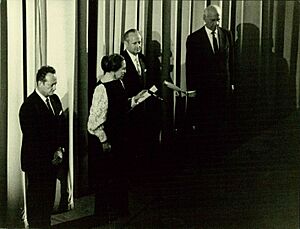
For twelve years, Sanbar was chairman of the board of trustees for Habima Theatre. This was from 1969 to 1981. During this time, the theatre became Israel's national theatre. Sanbar helped define its new artistic vision. He also helped bring new audiences to the theatre. This included creating the theatre's first subscription program.
Founding of Janco-Dada Museum
In 1979, Sanbar began leading the effort to create a museum. This museum honored painter Marcel Janco in Ein Hod. Two years later, enough money was raised. The museum opened to the public in 1983. Sanbar was its honorary president for three decades, until his death.
Promoting Sports and Athletes
In 1967, Sanbar became the first chairman of the Israel Sports Betting Board. This organization manages the national football pool. He also chaired the Fund for Excelling Athletes. This fund gave money to athletes in many different sports. Sanbar often asked for donations to the fund from his arbitration cases. This helped buy equipment for athletes.
Academia and the College of Management
From 1972 to 1995, he was chairman of the board of trustees for The College of Management Academic Studies. In 1978, the College became a formal institute of higher education. He also served as chairman of the executive from 1983 to 1989.
He was also a member of the executive at Tel Aviv University and the Technion. He served on the board of trustees for the Hebrew University and Bezalel Academy of Arts and Design.
Sanbar also taught statistics at the Hebrew University. He was a visiting professor of economics at Tel Aviv University. In 1971, he helped found the Foerder Institute of Economic Research.
Helping Holocaust Survivors
Since 1987, Sanbar was very active in helping Holocaust survivors. He helped found the Umbrella Organization for Holocaust Survivors in Israel in 1987. He was its chairman for many years. He later became its honorary president. In 2011, he became chairman again.
Under Sanbar's leadership, the umbrella organization was represented in the Claims Conference. He was the international treasurer and later chairman of the executive for the Claims Conference. He helped get reparations for new groups of victims. This included survivors from Eastern Europe and forced labor camps. He also helped make sure that 80% of funds went to survivors in need. The rest went to education and remembrance projects. In Israel, he helped establish the Foundation for the Welfare of Holocaust Victims.
Sanbar was also a founder of the World Jewish Restitution Organization. He published a book in 2000 called "Holocaust Gold From The Victims to Switzerland." He served on international commissions about property restitution. In 2011, he became an honorary member of the European Shoah Legacy Institute.
In Israel, Sanbar was involved with many Holocaust remembrance institutions. He was chairman of the board of trustees at Massuah Institute for Holocaust Studies. He was also a member of the council of Yad Vashem. In 1998, he was the main speaker at the annual memorial service for Yom HaShoah at Yad Vashem.
Later Years and Passing
In his later years, Sanbar focused mostly on helping Holocaust survivors. He worked with various committees and organizations. In 2008, he advised on a plan to protect pension funds in Israel.
His biography, "Signed on the Bill: An Economist in a Political World," was published in 2010.
Moshe Sanbar passed away on October 1, 2012, in Tel Aviv. He was buried the next day. Many important figures spoke at his funeral.
Honors and Recognition
Moshe Sanbar received many awards and honors during his life:
- Herzl Prize for his public work (1973)
- Honorary citizenship of Pueblo, Colorado (1978)
- Ministry of Interior Award for his work with municipalities (1986)
- Special Humanitarian Award by B'nai B'rith (1995)
- Honorary Doctorate by Bar-Ilan University (2000)
- Israeli Chamber of Commerce honor for lifetime achievements (2004)
- The Light Award by the Fund for the Welfare of Holocaust Survivors (2012)
- Honorary citizenship of Metula (1973)
- Distinguished citizen of Tel Aviv (2000)
In 2004, he received the Order of Merit of the Republic of Hungary. This is the highest civilian award in Hungary.
In 2003, the College of Management in Israel honored him. They created the Moshe Sanbar Institute for Applied Economic Research. A book celebrating 50 years of the Israeli economy was also published in his honor. After his death, the Claims Conference named a building after him at the Dorot Medical Center.
Sanbar's personal records and documents are kept at the Israel State Archives and Massuah Institute of Holocaust Studies.
Authored Books
Moshe Sanbar wrote many research papers and articles. These were about economic policy, taxation, and other money-related topics. He also wrote and edited several books in English.
 | Percy Lavon Julian |
 | Katherine Johnson |
 | George Washington Carver |
 | Annie Easley |


